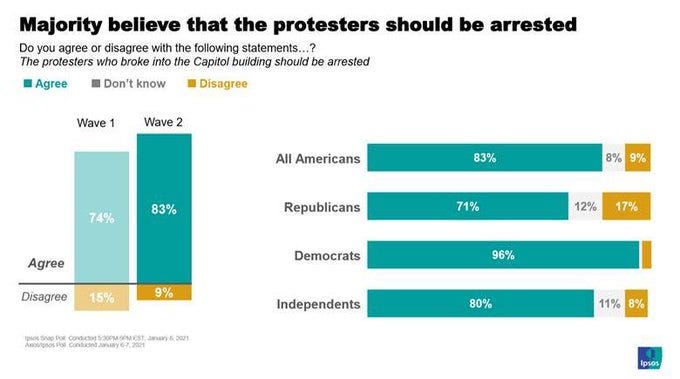More short thoughts on the coup
Just killing time til the climax starts this weekend
It’s kind of hard to think about anything other than the coup right now. With further Trumpist insurrection looming in just a few days, the National Guard being deployed in force, and both impeachment and the 25th Amendment still on the table, who wants to read nerdy blog posts about inflation or pro-density zoning? Which is not to say I won’t write these posts over over the next week, but more as a distraction to keep myself sane.
In the meantime, here are more fun COUP THOUGHTS! But also, I’m experimenting with doing really crazy things with my blog, so I’m going to try putting the “subscribe” and “share this post” buttons at the top of the post instead of at the bottom. GASP.
Impeachment as a delaying tactic
Impeaching Trump with only a few days left to go in his presidency seems, upon cursory examination, like a symbolic move. His supporters would still regard him as the true and rightful president — after all, losing an election didn’t stop them from thinking that, so why would impeachment and removal? It wouldn’t stop him from agitating for violence on the days leading up to inauguration. It wouldn’t stop him from issuing a big wave of pardons (including a ludicrous self-pardon) on his last day. At best it might allow a more smooth deployment of security forces in D.C. on and before inauguration day, but it’s not even clear he’s calling the shots on that front anymore.
But while a symbolic impeachment would still be a good move — Trump tried to overturn a free and fair election, then encouraged an insurrection against Congress — I think there’s something else going on here. I think it’s a delaying tactic — a way to keep Trump occupied in the final days of his presidency so he causes as little additional trouble as possible. The more he focuses on Congress’ attempt to impeach him, the less attention Trump has to spend on ginning up further insurrectionary violence. In fact, Republican obstruction of impeachment actually helps serve that goal — when the GOP blocks impeachment, it makes Trump feel like he’s winning something, which reduces his impetus toward violent mayhem. In other words, while impeachment might seem like a theatrical show to please Democratic voters, the real purpose might be a theatrical show to entrance the Mad King.
Lessons from the Sanjurjada
I’m pretty addicted to Spanish Civil War analogies. But the failed rightist coup that preceded the Spanish Civil War by four years — called the Sanjurjada, after its leader, General José Sanjurjo — is not actually a very good analogy for the Trumpist coup attempt of 1/6. For one thing, it was a military coup, led by multiple generals, and involving a lot of troops (though not nearly as many as the plotters had hoped, which is why it failed). For another thing, it was less ideologically motivated — though the perpetrators were rightists by general orientation, their policy plans were not very ideological at all. In fact, their chief concern was military budgeting — the elected government of the Spanish Second Republic was trying to shrink the army.
So, what lessons does this episode hold for America in 2021? Well, the Trumpists have a scattering of ex-military people among them, but the U.S. Military as an institution is firmly against their attempts to toppled the Republic, as is the officer corps. Current and former military officers have made many more statements criticizing Trump than supporting him. As long as that remains true, Trumpist insurrections are bound to fail.
But just in case, Progressives in Congress should really not be trying to cut military spending right now.
The long road back from Trumpism
Here, via the always-excellent Paul Poast, is a series of polls of Republican voters regarding Trump, the coup attempt, and the election. It’s pretty grim news overall.
About the same number of Republicans support the coup attempt of 1/6 as oppose it:
And only half think the perpetrators should be prosecuted:
Update: An Ipsos poll shows much better numbers:
Meanwhile, a strong majority of Republicans still believe in the “voter fraud” lie that inspired the coup attempt in the first place:
Trumpism is a cohesive ideology that has captured most of the Republican party. It is not something we need to psychoanalyze or explain right now; that can come later. For now we must acknowledge it as a cohesive, autonomous ideology that must be named and opposed. We will not defeat Trumpism by defeating white supremacy or toxic masculinity or economic decline; it’s too late for all that. We will only defeat Trumpism by defeating Trumpism.
But how? I think naming and stigmatizing the ideology itself is a powerful and important step. Though Trumpism has captured most of the conservative movement, to say “Trumpism is conservatism” is not just pointless but counterproductive. It’s counterproductive because it dilutes the power of the name, and of the stigma. But even more importantly, it’s counterproductive because it denies people an off-ramp for when Trumpism is eventually crushed.
When Trumpism is crushed, lots of people who supported Trump or believed in “voter fraud” etc. are going to want to get off the bus — just lots of Germans after WW2 wanted to disavow having supported the Nazis. That’s fine. We should let most of them do that. Right now, liberals are feeling justifiably scared and outraged and frustrated all at the same time, and that gives them dreams of pursuing everyone who ever voted for Trump to the ends of the Earth. But those are tens of millions of Americans. Far, far too many to anathematize or live without. Unless liberals want to partition this country (which they shouldn’t) or commit some kind of mass expulsion (which they don’t), they’re going to have to live with tens of millions of Americans who just want to forget about how they once supported an evil, crazy, fucked-up ideology. So letting those people go back to calling themselves “conservatives”, or some other name, will be an essential part of the healing process. I understand people are too angry to think about the healing process right now, but it’s going to have to come.
Of course, there will be those who never repent and who never want an off-ramp. These few we will have to stigmatize — for example, by cutting off money to politicians who go along with Trumpist conspiracies. And an even smaller number will continue to try to pursue violent insurrection in an attempt to overthrow the Republic. These must be incarcerated.
BLM Whataboutism
In their quest to find some way to look at the coup attempt of 1/6 and think anything other than “OMG I supported the Bad Guys”, people on the Right are running through a number of self-defensive lines. “It was just a few people taking selfies” is a somewhat popular one, though it’s somewhat belied by the abundance of truly frightening camera footage and the murder of a Capitol policeman. “Let’s move on and get past this and heal” is another, but it sounds kinda wimpy and forlorn. But by far the most common excuse line I’m hearing from the Right is “what about BLM?”
Update: In the comments, @browncoatjeff issues the following clarification:
Now, I agree with German Lopez and others that America has yet to grapple with the extent of the damage done by a violent fringe during the George Floyd protests in the summer of 2020. But the difference with the Trumpist insurrection couldn’t be starker. It’s pretty stupid that I even have to make this case, but anyway:
The causes of the two groups were very different. The BLM protesters were mostly protesting police brutality and racism; even if you disagree about how big a problem those are, you can probably agree that police brutality and racism are bad things. Meanwhile, the Trumpist insurgents were and are trying to overthrow the duly elected Congress of the United States of America — which would mean, in effect, overthrowing the Republic and making us a fascist state. I hope we can all agree that that is bad.
The Floyd protests were overwhelmingly peaceful. A few anarchists showed up and burned stuff. Some looters showed up and opportunistically looted. Portland and Seattle were the two notable exceptions, where violent protests were the norm. Elsewhere, it was only the sheer scale of the protests — tens of millions of participants in hundreds of cities — that ensured that a tiny violent fringe would exist. But BLM is an overwhelmingly peaceful movement. The Trumpist insurrection, on the other hand, is explicitly pro-violence. 5 people were killed on 1/6 in an action involving only a thousand Trumpists; 19 people were killed in a week of protesting that involved literally 10,000 times that many BLM protesters. The degree of violence is simply not comparable. And as for property damage, while it’s important, the damage of overthrowing the Republic would be far far more terrible.
So if you have even the slightest urge to draw an equivalence between BLM and the Trumpist insurrection, you need to get your head checked.
Literally Hitler
How did people not look at Hitler and think “OMFG, this dude is literally HITLER”???









Totally agree on the offramp point. There’s a tendency to pounce on the few never-Trump Republicans make loud, critical statements about Trump, since they themselves have opened themselves up to criticism. The criticism is valid, and some have themselves reflected on what responsibility they bear for Trump (thinking of Stuart Stevens’ “It Was All a Lie”), but we should really be empowering and encouraging this moderate wing of Romney et al. to retake their party. Oddly, one of the silver linings of this awful week is the license Trump so glaring insane behavior, coupled with electoral defeat, gives to Republicans to get off the Trump train. Really, the kindest thing Democrats can do for Republicans is to continue beating them in swing elections until morale impoves and they decide to rebuild their coalition 😉
> But by far the most common excuse line I’m hearing from the Right is “what about BLM?”
It's an excuse line, but I don't think it's one that can be taken as a good-faith argument.
Broadly speaking, the system reacted strongly against BLM protestors. Police did mobilize, and federal law enforcement also was sent in -- sometimes even over the objections of local authorities. The contrast with the Capitol rioters was obvious, where the (initial) security response was much weaker.
Democrats can make an argument that the system was wrong in both cases, treating BLM too harshly and the Capitol rioters too leniently.
However, the "what about BLM" counter-argument is _not_ a free-standing argument in its own right; it does not make a positive claim about how the Capitol rioters should be treated. Instead, it's a meta-argument: if Democrats are right about BLM treatment, then the Capitol response was appropriate.
That's weak. For "what about BLM" to be right, its proponents have to be wrong about BLM. It's ultimately an accusation of bad faith on the part of liberals: whataboutism in its purest form. I don't think that treating it seriously as a meritorious argument will do any good, since it's an argument about the character of liberals and not really an argument about BLM/security responses.
In the longer view, if "what about BLM" does become the predominant Republican defense, I don't think that bodes well for rapid de-escalation of political violence. That sort of cover (which I suppose would be matched with "what about the Capitol" on the far left) normalizes a simmering, low-grade violent background.